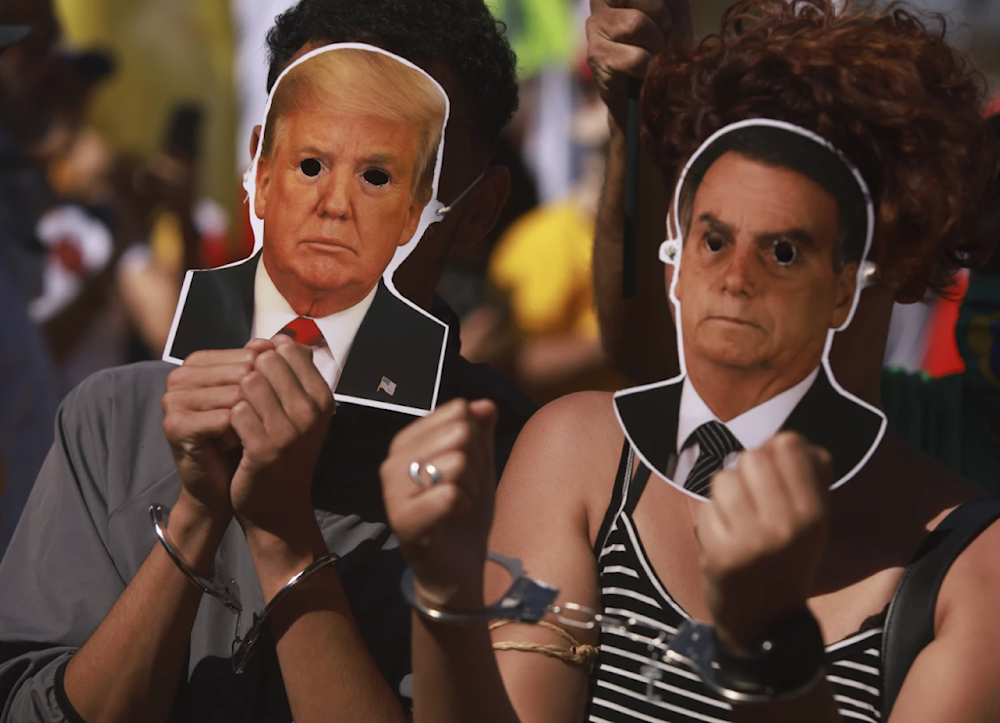US planning new sanctions on Brazil, son of Bolsonaro says
Eduardo Bolsonaro has been spearheading a lobbying campaign in Washington, urging the US government to take action against Brazil’s Supreme Federal Court in a bid to shield his father from a potential prison sentence.
-

Demonstrators in handcuffs hold photos of US President Donald Trump and former Brazilian President Jair Bolsonaro to protest a 50% tariff on Brazilian goods on August 1, 2025. (AP)
The US is expected to escalate tensions with Brazil over the prosecution of former president Jair Bolsonaro by imposing additional sanctions on Brazilian justices who refuse to halt his trial for alleged coup plotting, according to Eduardo Bolsonaro, the ex-president’s son and a sitting congressman.
Eduardo Bolsonaro has been spearheading a lobbying campaign in Washington, urging the US government to take action against Brazil’s Supreme Federal Court in a bid to shield his father from a potential prison sentence. Bolsonaro is currently on trial for allegedly conspiring to overturn the results of the 2022 election, which he lost to President Luiz Inácio Lula da Silva.
In a video interview with the Financial Times, Eduardo said he has met with members of the Trump administration and predicted earlier this year that Washington would sanction the judge overseeing the trial, Alexandre de Moraes. “I know [Trump] has a range of possibilities on his table, from sanctioning more Brazilian authorities, to a new wave of visa withdrawals, to tariff issues,” he said.
The US recently imposed 50% tariffs on Brazilian goods and barred eight Supreme Court justices from entering the country, citing not only the Bolsonaro trial but also the court’s regulation of US social media platforms and ongoing trade disagreements.
Despite the US imposing one of the highest tariff hikes under Trump’s administration, Lula expressed confidence that Latin America’s largest economy has enough resilience to withstand the pressure. Unlike some Western counterparts, Lula appears determined to hold firm without ceding to Washington’s demands, which infringe on Brazil's sovereignty.
Ratcheting up pressure on de Moraes
Trump has condemned Jair Bolsonaro's trial as a “witch hunt,” while de Moraes has pushed for tougher actions, including placing Bolsonaro under house arrest for violating a social media ban.
The ban, which also restricts communication between Bolsonaro and his son Eduardo, was imposed after de Moraes accused them of seeking US intervention to derail the legal proceedings. Eduardo Bolsonaro claimed de Moraes has exhausted his options, while Trump still has room to escalate pressure.
“I believe there could be a strong response here from the US," Eduardo said, suggesting potential sanctions on de Moraes’ wife, whom he called his “financial arm”, as well as new visa revocations targeting the judge’s allies.
The US has imposed Magnitsky sanctions on Brazilian Supreme Court Justice Alexandre de Moraes, freezing any assets he holds in the US and prohibiting American individuals and companies from doing business with him. These sanctions are typically used against foreign officials accused of serious human rights abuses or corruption. In announcing the move, Treasury Secretary Scott Bessent accused de Moraes of leading “an oppressive campaign of censorship,” carrying out politically motivated prosecutions, and ordering arbitrary detentions.
European push and domestic backlash
Eduardo Bolsonaro has vowed to expand his campaign against Brazil’s judiciary to Europe, expressing that he plans to travel to lobby EU lawmakers to impose similar sanctions on de Moraes.
Although Eduardo is expected to find support among hard-right European politicians, they remain a minority in the European Parliament. Nonetheless, 16 MEPs, including Poland’s Dominik Tarczyński, recently urged the EU’s foreign affairs chief, Kaja Kallas, to consider targeted sanctions against de Moraes and other top Brazilian justices for alleged human rights violations.
In Brazil, Eduardo’s efforts have drawn sharp criticism. Opponents accuse him of acting against national interests, blaming his campaign for triggering steep US tariffs that could damage exports and cost jobs.

 4 Min Read
4 Min Read








